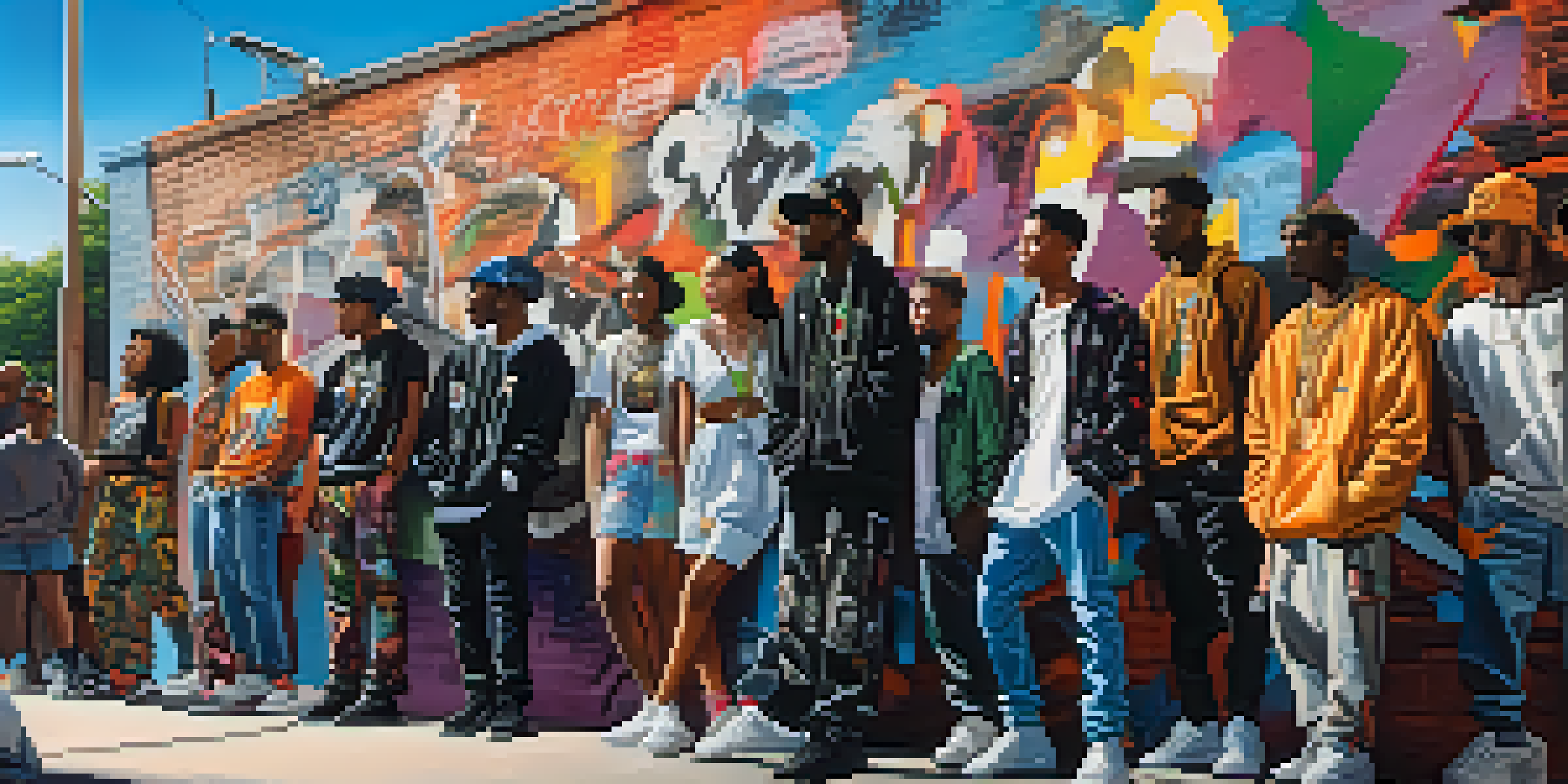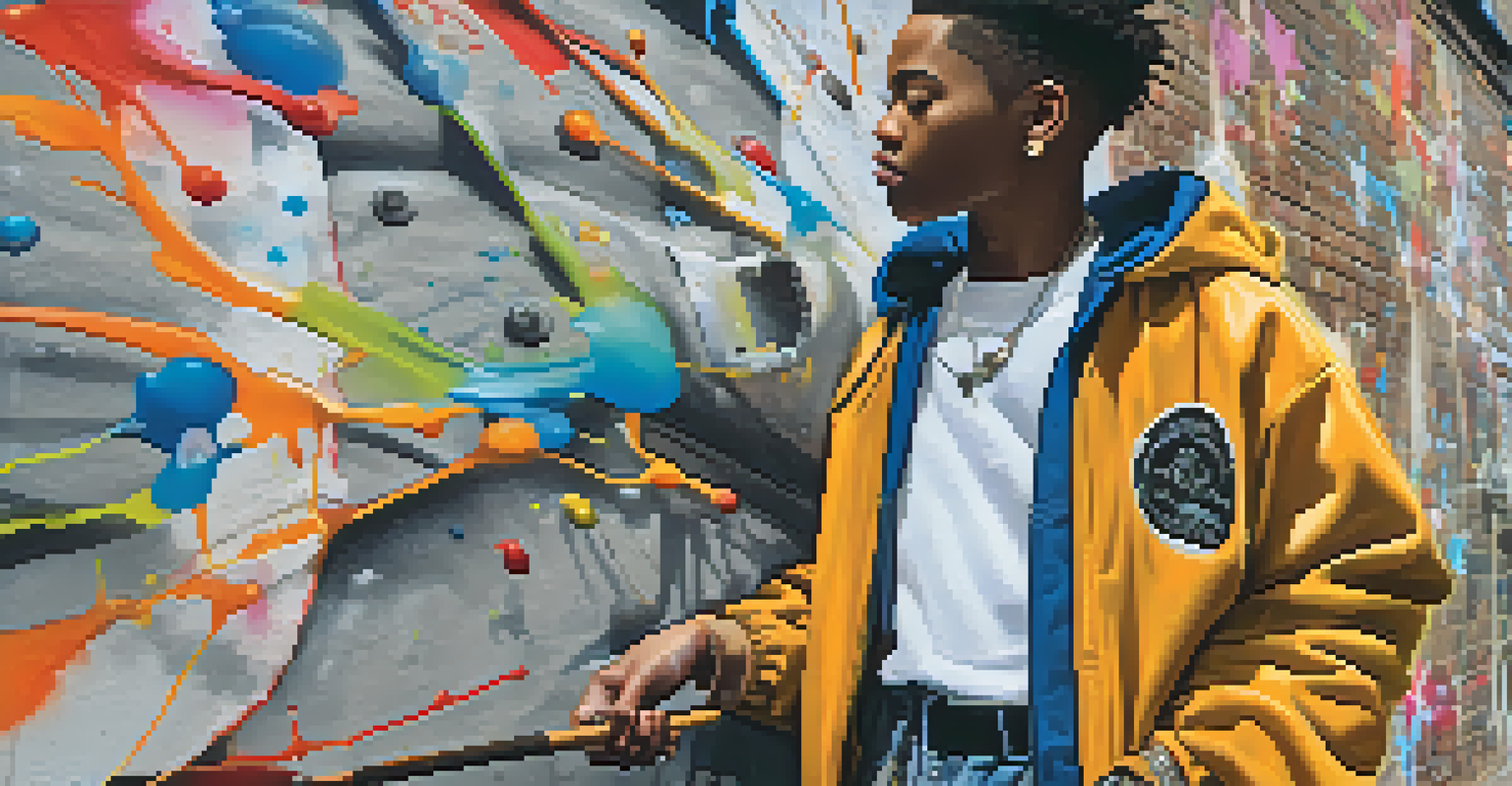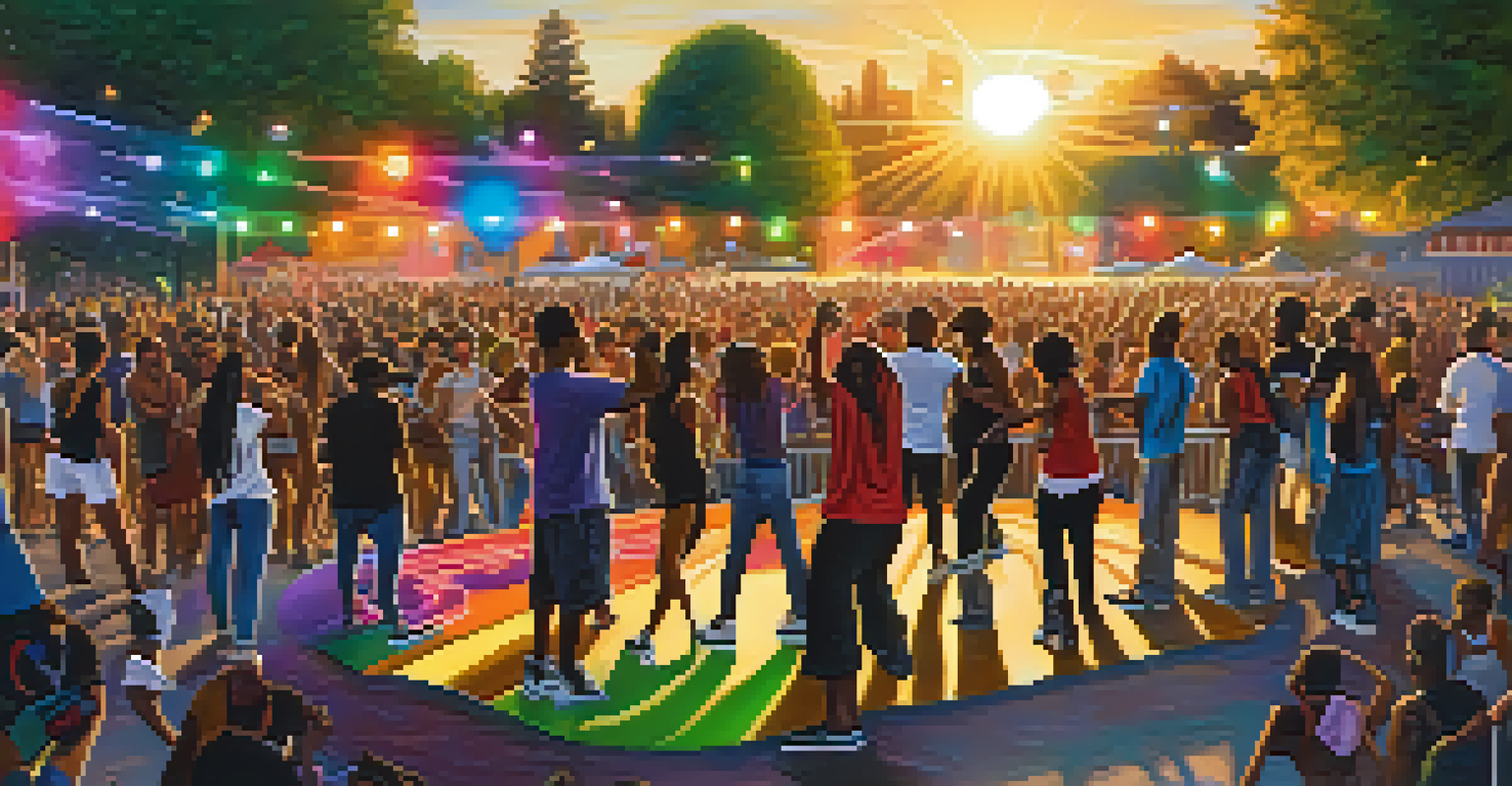How Hip-Hop Shaped Youth Culture and Trends in NYC Today

The Origins of Hip-Hop and Its Cultural Significance
Hip-hop originated in the 1970s in the Bronx, New York, as a creative outlet for marginalized youth. It began as a fusion of music, dance, and visual art, reflecting the struggles and aspirations of the community. This vibrant culture quickly evolved, becoming a voice for the voiceless and a representation of urban life.
Hip-hop is the voice of the marginalized, a cultural expression that reflects the struggles and aspirations of the community.
As hip-hop grew, it incorporated elements from various genres, including funk, soul, and reggae, creating a rich tapestry of sounds. The genre's cultural significance lies in its ability to express social commentary, making it a powerful tool for change. It resonates with young people, offering them a sense of identity and belonging.
Today, hip-hop continues to be a driving force in youth culture, influencing not just music but fashion, language, and social movements. Its roots in the Bronx remind us of the power of community and creativity in shaping cultural narratives.
How Hip-Hop Shapes Fashion Trends Among Youth
Fashion and hip-hop have always shared a close relationship, with artists influencing styles and trends. From the oversized clothing of the 90s to today's designer collaborations, hip-hop sets the tone for what’s considered fashionable. Young people in NYC often look to their favorite artists for inspiration, adopting styles that reflect their personalities and aspirations.

Streetwear, a genre heavily inspired by hip-hop, has exploded in popularity, merging comfort with high fashion. Brands like Supreme and Off-White have become synonymous with the hip-hop lifestyle, appealing to youth culture's desire for authenticity and status. This trend showcases how hip-hop continues to redefine what it means to be stylish.
Hip-Hop's Cultural Roots and Impact
Originating in the Bronx, hip-hop serves as a powerful voice for marginalized youth, reflecting their struggles and aspirations.
Moreover, social media plays a crucial role in spreading these trends. Platforms like Instagram and TikTok allow young people to showcase their fashion sense, creating a cycle where hip-hop influences everyday clothing choices. This democratization of fashion means that anyone can participate in the trend, further embedding hip-hop into the fabric of NYC youth culture.
Hip-Hop's Role in Language and Slang Evolution
Language is a living entity, constantly evolving, and hip-hop has been a significant catalyst in this evolution. The genre has introduced unique slang and phrases that have permeated everyday speech, especially among youth in NYC. Terms like 'lit' and 'flex' have become mainstream, showcasing hip-hop's ability to shape communication.
The power of hip-hop lies in its ability to inspire change and foster a sense of belonging among youth.
Incorporating hip-hop lingo into conversations allows young people to connect with one another and express their identity. It creates a sense of belonging and solidarity, as shared language often signifies membership in a community. This dynamic reinforces the influence of hip-hop on how youth perceive themselves and interact socially.
Additionally, the creativity found in hip-hop lyrics often inspires young people to experiment with language, encouraging them to express themselves more freely. This linguistic innovation not only fuels personal expression but also fosters a cultural dialogue that spans beyond music into everyday life.
The Impact of Hip-Hop on Social Movements
Hip-hop has long been intertwined with social and political movements, providing a platform for voices often overlooked. In NYC, artists use their influence to address issues like racial inequality, police brutality, and economic disparity. This connection empowers youth to engage in advocacy and activism, using hip-hop as a tool for change.
The genre's ability to convey powerful messages through lyrics resonates deeply with young audiences, inspiring them to take action. Events like protests and community gatherings often feature hip-hop performances, merging art with activism. This blend underscores the importance of hip-hop in fostering a sense of social responsibility among youth.
Fashion Trends Influenced by Hip-Hop
Hip-hop significantly shapes youth fashion, with artists dictating styles that blend comfort and high fashion, particularly through streetwear.
Moreover, hip-hop encourages young people to articulate their experiences and challenges, uniting them in a collective struggle for justice. By connecting with artists who share their realities, youth find motivation and hope, reinforcing hip-hop's role as a catalyst for social change in NYC.
Hip-Hop and Digital Culture: Redefining Engagement
In today's digital age, hip-hop's influence extends far beyond music and fashion; it shapes how youth engage online. Social media platforms allow for real-time interaction with artists, creating a unique relationship between fans and creators. This direct engagement fosters a sense of community and belonging among young people who share a passion for hip-hop.
Furthermore, the rise of streaming services has transformed how hip-hop music is consumed. Young listeners can access a vast library of tracks and discover emerging artists, broadening their musical horizons. This accessibility has democratized the genre, allowing a diverse range of voices to be heard and celebrated.
However, the digital landscape also presents challenges, such as the pressure to curate a perfect online persona. Youth often feel the need to reflect the lifestyles of hip-hop stars, which can lead to unrealistic expectations. Despite this, hip-hop remains a powerful medium for self-expression and connection among young people in NYC.
Hip-Hop's Influence on Sports and Athletic Culture
Hip-hop and sports have a longstanding relationship, with athletes often embracing hip-hop culture and vice versa. This connection is particularly evident in NYC, where basketball courts and music venues frequently overlap. The mutual admiration between rappers and athletes creates a shared language of ambition and success that resonates with youth.
Many athletes, like LeBron James and Steph Curry, have incorporated hip-hop into their personal brands, from fashion choices to music collaborations. This blend of sports and hip-hop culture inspires young people to pursue their passions, whether on the court or in the studio. It encourages a mentality of hard work, resilience, and creativity.
Hip-Hop as a Catalyst for Change
The genre empowers youth to engage in social movements, using music as a platform to address issues like inequality and injustice.
Moreover, hip-hop's presence in sports extends to events like the NBA All-Star Game, where music performances enhance the overall experience. This synergy highlights how hip-hop continues to shape the narratives surrounding sports, making it an integral part of youth culture in NYC.
The Future of Hip-Hop and Its Ongoing Influence
As we look ahead, it’s clear that hip-hop will continue to evolve and influence youth culture in NYC and beyond. New artists are constantly emerging, bringing fresh perspectives and sounds that reflect the changing landscape of society. This continual innovation ensures that hip-hop remains relevant and resonant with younger generations.
The genre's adaptability allows it to address contemporary issues, from climate change to mental health, ensuring that it speaks to the experiences of today’s youth. As hip-hop artists take on these themes, they inspire young people to think critically and engage with their world.

Ultimately, hip-hop's impact on youth culture in NYC is a testament to its power as a form of artistic expression. Whether through music, fashion, or social activism, hip-hop maintains its position as a vital cultural force, shaping the identities and aspirations of young people for years to come.